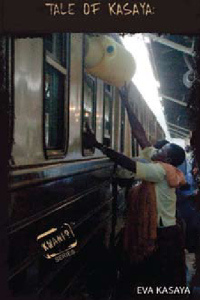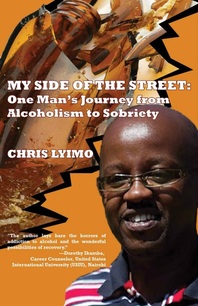
Author: Eva Kasaya
Tale of Kasaya is a story that affirms humanity as the corner stone of dignity. It is an easy-to-read and exciting narrative by Eva Kasaya about her experiences as a house girl in Nairobi.
The story begins from Kasaya's early childhood on a coffee plantation in Thika, and chronicles her family's hardships that led her to drop out of school and make the daring journey to Nairobi to work as a house girl. After different harrowing experiences in different homes in Nairobi, she eventually lands a job in a home where she is treated like a human being and eventually transitions to a career in tailoring.
Tale of Kasaya is a mirror held up to Kenya in many ways. For me, the most striking element was how, in this age where devolution is the buzz word, oppression, exploitation and high handedness are devolved to the homes. In the private spaces from Kibera to Kileleshwa, fellow Kenyans treat others with little dignity, and worst of all, this treatment comes from the hands of women. Kasaya is harassed, made to work long hours without pay, and patronized by members of the very group that suffers such oppression as a block that produces over 80% of the country's wealth but owns only a little over 1% of it. The story is a reminder that democracy and freedom must resonate not only in the corridors of political power but also in the privacy of our own homes.
The other interesting element for me was the power of dreams and of dignity. Kasaya was driven by a dream of opportunity to make the life of herself and her family better, and that opportunity was represented by Nairobi. Nairobi initially failed to deliver that promise but eventually came through for Kasaya. Kasaya’s drive to find opportunity proves that the measure of a country’s freedom should be the extent to which the country provides its citizens with the opportunity to live a dignified life.
Tale of Kasaya can also be described as a panorama of Nairobi in words, although one that is often interrupted by typographical errors and awkward expressions. We first get an outsider’s view of the city from the perspective of the Kerongo villagers who are told exaggerated tales of cultural artifacts such as TV soap operas and Kanda Bongoman dance moves. Through Kasaya’s narrative, we get an experience of the train and main public transport stages, then the poverty and terrible living conditions in the slums and then the comfort of the more affluent areas of Nairobi. The contrasts in the landscape are also in the people, from the homes of people like Nancy in the slums, of oppressive (and frankly psycho) characters like Mama Jacky, to the humane couple who give Kasaya a new perspective of life. When the city of Nairobi celebrates its history, I hope it will encourage the reading of this book as a cultural landmark.
As the central character, Kasaya represents the strength of dignity and the human spirit. Under each employer, she strives to work the best she can, and does not carry the bitterness from one home to the next. Finally, Kasaya defies the cynical love of money to which many Kenyans succumb. Her wish is simple: to be treated as a human being, to have a decent job and to help her family. But the ultimate affirmation of her humanity comes from the very fact of writing her story. Before she starts writing, she says, her life appeared fragmented, with each episode forgotten as soon as the new one begins. Some parts of her life even “seemed as though [they] had never happened” and even her success was not hers; rather, it “was pegged to what the villagers said about me.” By writing, therefore, Kasaya affirms that despite her humble origins, her life is an important part of the Kenyan narrative.
Tale of Kasaya is a story that affirms humanity as the corner stone of dignity. It is an easy-to-read and exciting narrative by Eva Kasaya about her experiences as a house girl in Nairobi.
The story begins from Kasaya's early childhood on a coffee plantation in Thika, and chronicles her family's hardships that led her to drop out of school and make the daring journey to Nairobi to work as a house girl. After different harrowing experiences in different homes in Nairobi, she eventually lands a job in a home where she is treated like a human being and eventually transitions to a career in tailoring.
Tale of Kasaya is a mirror held up to Kenya in many ways. For me, the most striking element was how, in this age where devolution is the buzz word, oppression, exploitation and high handedness are devolved to the homes. In the private spaces from Kibera to Kileleshwa, fellow Kenyans treat others with little dignity, and worst of all, this treatment comes from the hands of women. Kasaya is harassed, made to work long hours without pay, and patronized by members of the very group that suffers such oppression as a block that produces over 80% of the country's wealth but owns only a little over 1% of it. The story is a reminder that democracy and freedom must resonate not only in the corridors of political power but also in the privacy of our own homes.
The other interesting element for me was the power of dreams and of dignity. Kasaya was driven by a dream of opportunity to make the life of herself and her family better, and that opportunity was represented by Nairobi. Nairobi initially failed to deliver that promise but eventually came through for Kasaya. Kasaya’s drive to find opportunity proves that the measure of a country’s freedom should be the extent to which the country provides its citizens with the opportunity to live a dignified life.
Tale of Kasaya can also be described as a panorama of Nairobi in words, although one that is often interrupted by typographical errors and awkward expressions. We first get an outsider’s view of the city from the perspective of the Kerongo villagers who are told exaggerated tales of cultural artifacts such as TV soap operas and Kanda Bongoman dance moves. Through Kasaya’s narrative, we get an experience of the train and main public transport stages, then the poverty and terrible living conditions in the slums and then the comfort of the more affluent areas of Nairobi. The contrasts in the landscape are also in the people, from the homes of people like Nancy in the slums, of oppressive (and frankly psycho) characters like Mama Jacky, to the humane couple who give Kasaya a new perspective of life. When the city of Nairobi celebrates its history, I hope it will encourage the reading of this book as a cultural landmark.
As the central character, Kasaya represents the strength of dignity and the human spirit. Under each employer, she strives to work the best she can, and does not carry the bitterness from one home to the next. Finally, Kasaya defies the cynical love of money to which many Kenyans succumb. Her wish is simple: to be treated as a human being, to have a decent job and to help her family. But the ultimate affirmation of her humanity comes from the very fact of writing her story. Before she starts writing, she says, her life appeared fragmented, with each episode forgotten as soon as the new one begins. Some parts of her life even “seemed as though [they] had never happened” and even her success was not hers; rather, it “was pegged to what the villagers said about me.” By writing, therefore, Kasaya affirms that despite her humble origins, her life is an important part of the Kenyan narrative.

 RSS Feed
RSS Feed
